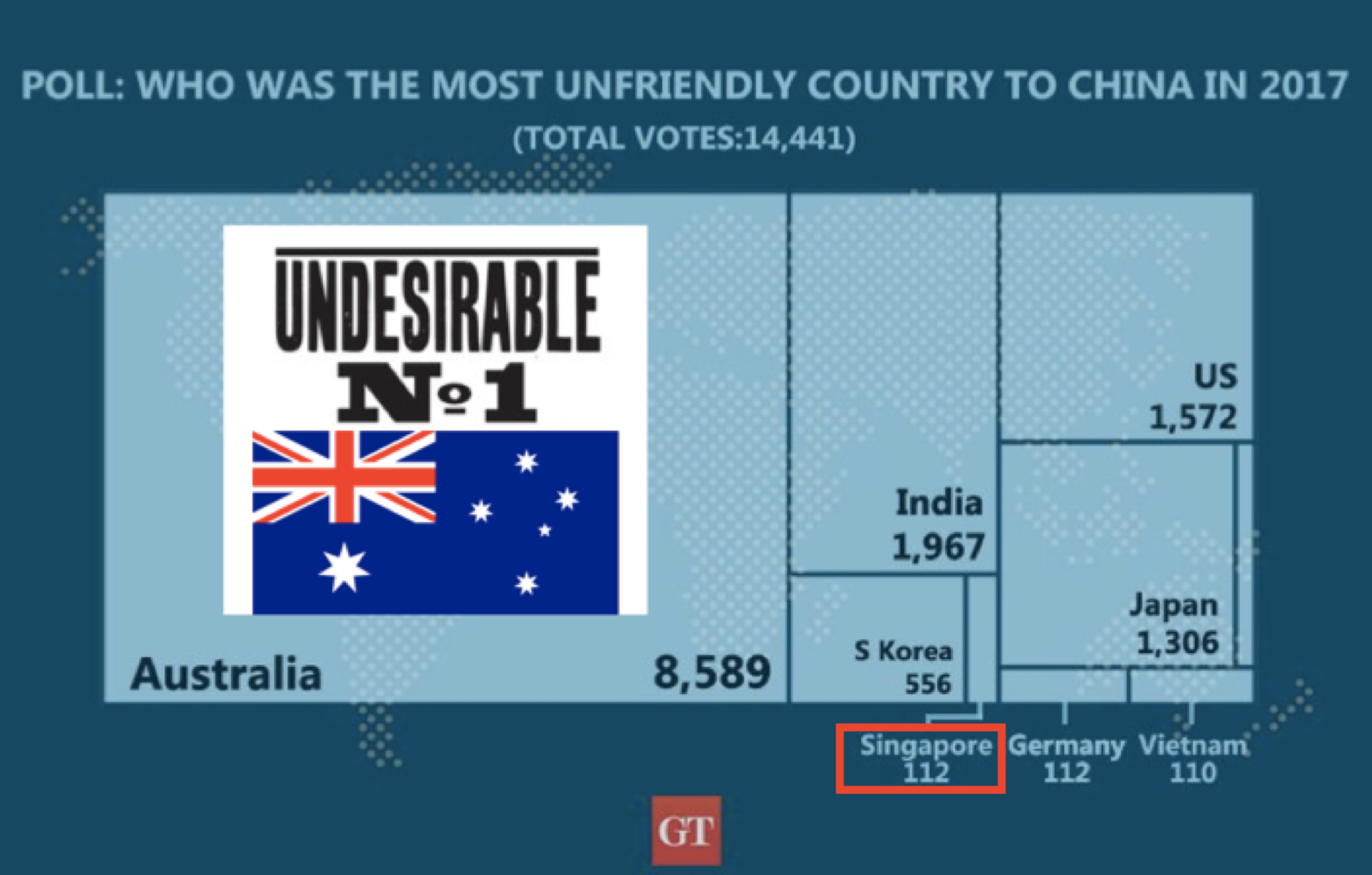Australia has been voted as the least friendly country to China in 2017 in a recent online poll answered by Chinese netizens.
The survey, conducted by Chinese state-owned news portal huanqiu.com (Global Times' Chinese website), which is well-known for its nationalistic views, asks just one simple question:
Which is the least friendly country to China in 2017?
Respondents are allowed to vote only once and pick just one choice.
The ban on Twitter in China did not stop Global Times from tweeting the result.
【Poll】 Least friendly country to China in 2017 https://t.co/iNnwEgpkDP :
— Global Times (@globaltimesnews) December 28, 2017
Australia 8589 votes
India 1967
US 1585
Japan 1327
South Korea 566
Germany 112
Singapore 112
Vietnam 110 pic.twitter.com/EDbTzn9t0f
According to Global Times, in just 2 days, Australia had received 8,589 votes out of 14,441 participants, or nearly 60% all votes.
Singapore was also named as one of the countries unfriendly to China. It got 112 votes, which was the same as Germany.
Chinese people's hatred of 'betrayal'
Some Chinese experts say that the result reflects the Chinese people's hatred of 'betrayal'.
Yu Lei, a research fellow at the Oceania Research Center of Sun Yat-sen University, said:
In Chinese culture, treachery is really despised, and this is a key reason why Australia received the most votes.
He added that Australian politicians and the media's "anti-China chorus" has become more rampant:
China has made efforts to sincerely boost bilateral cooperation, but Australia has never stopped inflaming hostility on the South China Sea issue.
Rising tensions between China and Australia
The poll results were released amidst rising tensions between China and Australia over the subject of foreign interference in domestic politics.
A prominent Australian lawmaker, Sam Dastyari, has recently quit the Australian Senate amid accusations about his involvement with Chinese donors.
And in response to growing concerns of Chinese interference in its domestic politics, Australian Prime Minister Malcolm Turnbull announced a series of new laws on Dec. 5 that would criminalise foreign interference and require the registration of lobbyists working for nation states.
The move prompted China to summon the Australian ambassador to China for "an important talk" to explain Turnbull's new policies.
China's foreign ministry had accused Turnbull of "poisoning" the relationship with his comments on China's attempts to influence Australian politics.
[related_story]
Perceived racism against the Chinese
Outside of politics, multiple disputes had also broken out between Chinese international students and their Australian universities, as the students complained about their professors using teaching materials that are incorrect or insulting to China.
Racist flyers were also discovered at two Melbourne universities in July, and three Chinese high school students were bashed in Canberra in Oct.
The Chinese government issued a public safety warning in Dec 2017 to Chinese students in Australians saying that they were at risk of attack or insults.
An American ally that's economically reliant on China
As a former British colony with a majority white population, Australia has viewed itself as an Anglosphere country for the most part of its history, despite its proximity to rising Asian powers like Indonesia and China.
The country also has a long-standing alliance with the US, and hosts a number of US bases.
However, Australia is also said to be the most China-reliant economy out of all OECD (Organisation for Economic Cooperation and Development) countries.
Even so, Chinese cash is scrutinised in Australia, due to the uncertainty regarding the role of Chinese state-owned enterprises and whether they represent a part of Chinese foreign policy.
Related Articles:
If you like what you read, follow us on Facebook, Instagram, Twitter and Telegram to get the latest updates.
